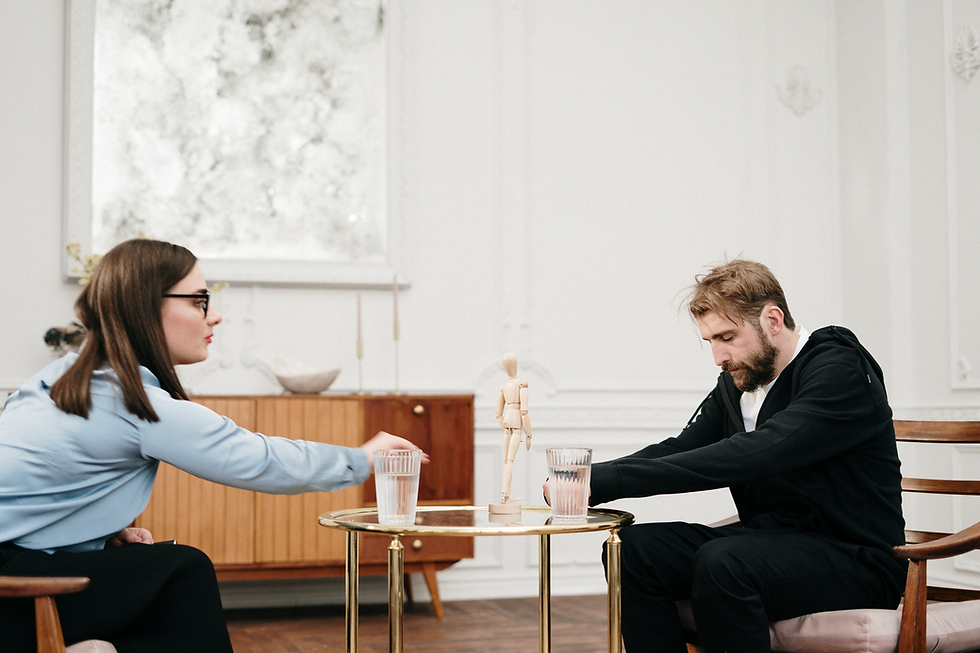The Psychological Relationship Between Fashion and Mental Health
- emanuelaowusu4
- Oct 29, 2021
- 4 min read
Updated: Oct 30, 2021

Everyday we get up and we get dressed, either to go to work, to hang out with friends, to stay home or even to go to a big event… The point is everyday we try to dress to fit the situation that we are in. Fashion is a way for us to express ourselves and this may unknowingly have a psychological impact on us.
Let’s set the scene, let’s say you are invited to a dinner party with people you do not know. They didn’t really give a certain dress code but when you arrive you realise that you are clearly underdressed. The question is would you be confident, or would you be less confident in this scenario?
The Psychological effect of fashion on you
If you answered yes, this shows how fashion may have a psychological effect on you. Research shows that most women, or 96% of people, believe that what they wear affects how confident they feel. Research provides a look into how clothing affects us and how we can improvise our clothes to improve our moods. For example, Robert Ridge, a psychology professor explains that “There definitely can be a connection between how people dress and how they feel. The more you like your appearance, the more confident you can be."
This shows how important our outfit choices can be and how it can influence our emotions and behaviour as individuals. Therefore, if you wake up and choose an ill-fitting outfit, it may not give you confidence and could possibly affect your mood throughout the day. This could cause a negative impact on your mental health.
So how exactly, can an outfit be altered to make a person more confident and happier? Professor Karen Pine from University of Hertfordshire considered this in her book “Mind What You Wear”. Professor Pine strongly believes that we can alter our mood by choosing to wear clothes that are associated with happiness and that will give us confidence. For example, many studies show that our “happy clothes” are well fitted with bright strong colours.
So, Professor Pine basically argued that “Not only are we what we wear, but we become what we wear”. Here's a list of examples of colours that could improve our moods and mental health. First, there is yellow, which is associated with happiness. Red is associated with excitement, but overuse may be a sign of seeking external validation. Green is associated with healing and soothing, or an overuse may signify envy. Orange is associated with energy and enthusiasm. Black is associated with power, but overuse may signify low energy or bad moods. When we wear clothing that can influence our psychological state, it is called the ‘enclothed cognition’.
Not only does fashion have an impact on our psychological state, but the fashion industry can also have a negative effect on you with the help of social media. The picture-perfect influencers with perfect skin and bodies have created an immense pressure on people to always look their best. So, if there is a latest fashion item which has become become a trend, it can cause many people to want to buy. However, if the fashion item does not look good on them like the picture-perfect influencers, it has a negative effect on their mental health. Factors such as body image and ‘beauty standards’ portrayed by the fashion industry can cause fashion to be harmful on your mental health.
The Psychological effect of fashion on the fashion industry
Talking about the fashion industry, let's explore how fashion affects people who work in the fashion industry. The International Conference on Addiction and Associated Disorders found that people in the fashion industry are 25% more likely to experience mental illness than any other industry. This could be for many different reasons, one of which could be the extensive pressure on models and designers to always be on top of the latest trends or even create them.
This means that models have an excessive pressure to always look good, cool and could potentially lead them to portray a ‘false life’ on social media. For example, this ‘false life’ could be done by editing pictures to make their skin clearer and bodies thinner, which again leads people who look up to influencers and models to have a negative portrayal of their own self. Nevertheless, recently there has been a small amount of social media cleanse of these false lifestyles. For example, many makeup ‘gurus’ on platform such as TikTok and YouTube have started to show their makeup with filters verses makeup with no filters. This has been helpful especially for vulnerable minds who think that these influencers have perfect skin with makeup, even though they don’t.
There have also been many YouTube and TikTok videos that show influencers using editing apps to edit their pictures or bodies to make them look more well fitted in clothes. Further, the fashion industry has started to also accept more people that are not fitted to the stricter ‘beauty standards’ that were in place in the past. This means a more diverse crowd can now also help portray a healthier image. This is an improvement but there is still more to do as most models and influencers are still expected to stay within a certain size and body for appearance.
Advice from me to you
So, while your fashion doesn’t define you, it can be the reason why you are confident and a way for us to express ourselves, or fashion can take a negative toll on your mental health. Nevertheless, as Audrey Hepburn said, “To pull off any look, wear it confidence!". Remember to be yourself as social media is not always true to the real life that most of these influencers portray.



Comments